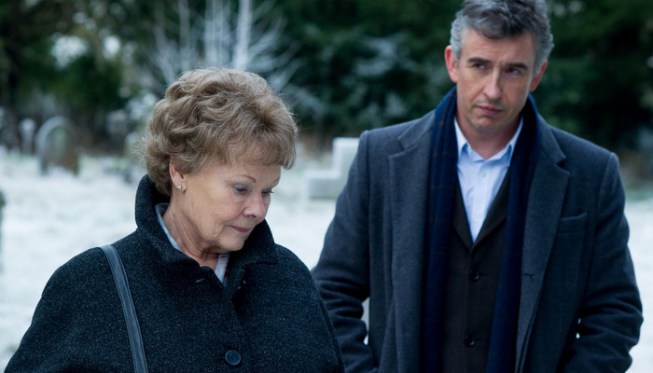“Mandela: Long Walk to Freedom”
Directed by Justin Chadwick
Starring Idris Elba, Naomie Harris, Tony Kgoroge, Riaad Moosa, Jamie Bartlett, Deon Lotz, Terry Pheto, Gys de Villiers
Biography, Drama, History
139 Mins
PG-13

Nelson Mandela deserved better than the dour glossary of events present in Mandela: Long Walk to Freedom. Failing to capture the spirit of the apartheid, except in bursts of violence amidst a rotation of disconnected massacres, Justin Chadwick‘s film replaces thoughtful reflection on a cultural epoch with as many headlines events as possible. Idris Elba‘s turn as the titular South African hero is the easy highlight of this otherwise throwaway film but the real motivation of Nelson and wife Winnie Mandela are trapped somewhere in the performances, left on the editing room floor, and never given enough room to breathe and evolve into the epic struggle we know the world around.
The biggest problem Mandela encounters is that it doesn’t seem to know what to keep and what to cut. Running over two hours and twenty minutes, the film is a definitive slog. From seeing Mandela as a young child growing up on the tribal plains of Mvezo to his election as president of South Africa, no detail is spared. Rather honing in on a number of significant events in Mandela’s life, William Nicholson‘s screenplay just blasts every minuscule detail in there. Inevitably, they land with as little impact as possible because of the snapshot nature of their inclusion. Had this host of details been incorporated into part of a larger scheme, or even a Mandela miniseries, this all inclusive tactic may have worked fine and given meaningful chapters to a meaningful life, but within the framework of a two-and-a-half-hour movie, the film feels bloated to the point of bursting.

Nicholson is no stranger to epics – he wrote the screenplay for Gladiator and Les Misérables – so there’s really no excuse for why the story got away from him. Letting the scope of the picture drive the story rather than the other way around, Nicholson’s script confuses information for intimacy. Instead of spending ample time getting to know Mandela, most of our meetings with him try to inform us of what kind of man he is. Rather than seeing the man in action, we hear about his actions secondarily – all serviced up expecting astonishment but frequently landing with a crunch. As a complete work, it’s closer in kind to Les Misérables‘ wandering structure than Gladiator’s streamlined epic. While Maximus’ journey was a natural progression of events that increased the stakes chapter by chapter until a massively rewarding climax, Mandela’s long walk feels dull and meaningless by comparison. This fact alone is a bit of a disgrace.
Beneath the cake of old man makeup, Elba gives a solid performance as Mandela but he’s unable to keep the rest of the project afloat. He’s got the choppy cadence and regal tone down pat, and it’s nice to him see escape his recent slate of blockbuster supporting roles, but Nicholson’s lackluster script, surprisingly enough, doesn’t give him a ton to work him. For a man who spent 27 years rotting away in a jail cell on Robben Island, few scenes spend time probing the spiritual roller coaster of Mandela’s evolving psyche.

Shifting from lawyer to outlaw, man to message, “terrorist” to president – and always trying his best to remain a peacemaker – the Mandela onscreen remains largely the same. For all the heated ideas of revolution stirring, we’re in the back corner wondering when all this chatter will die down so we can actually dig into the man’s mind. Instead, we are forced to take any “transformation” at face value. We’re frequently told of a man changed but there’s little supporting evidence for these bold claims of metamorphosis. This is a man considered by many to be next to sainthood and yet it feels like he hasn’t grown a day in the 80-odd years we see him onscreen.
Although not helped a lot by the words on the page, Naomie Harris flounders as Nelson’s wife, Winnie Mandela. Screaming and shrieking her way through most of her lines, she is a character with a very clear transformation but it all takes place behind some mystical curtain. Audiences in search of understanding will be largely disappointed as we never see the stepping stones leading from Winnie 1.0 to Winnie 2.0. She shifts overnight, in the shadows, robbing us of any semblance of understanding, meanwhile rendering the film even more vanilla for its unwillingness to dissect a controversial character.

Obviously the makers of this film had nothing but good intentions in the making of Mandela but the fact of the matter is not everyone can get a gold star for effort. Their goal is appropriate; to bring a balanced biopic with equal measures of entertainment and education; but it just never comes to fruition, it never follows through on its promise. In their textbook approach, they’ve lost the majestic sense of wonder we come to expect of a film. Sidelining a succinct story arc for tell-all testimony, Mandela is designed to be played by substitute teachers in History classes across America for the next decade. It’s unlikely to have much staying power beyond that.
Nelson Mandela was a man who championed compromise, so maybe this is a suiting film for his legacy. Instead of being deeply entertaining or deeply informative, it lands somewhere in the middle, compromising depth for surface level knowledge and sidelining deserved dramatic beats for melodrama. Instead of being a really good chapter of Mandela’s life, Mandela: Long Walk to Freedom is little more than the Nelson Mandela Spark Notes.
D+
Follow Silver Screen Riot on Facebook
Follow Silver Screen Riot on Twitter

















































